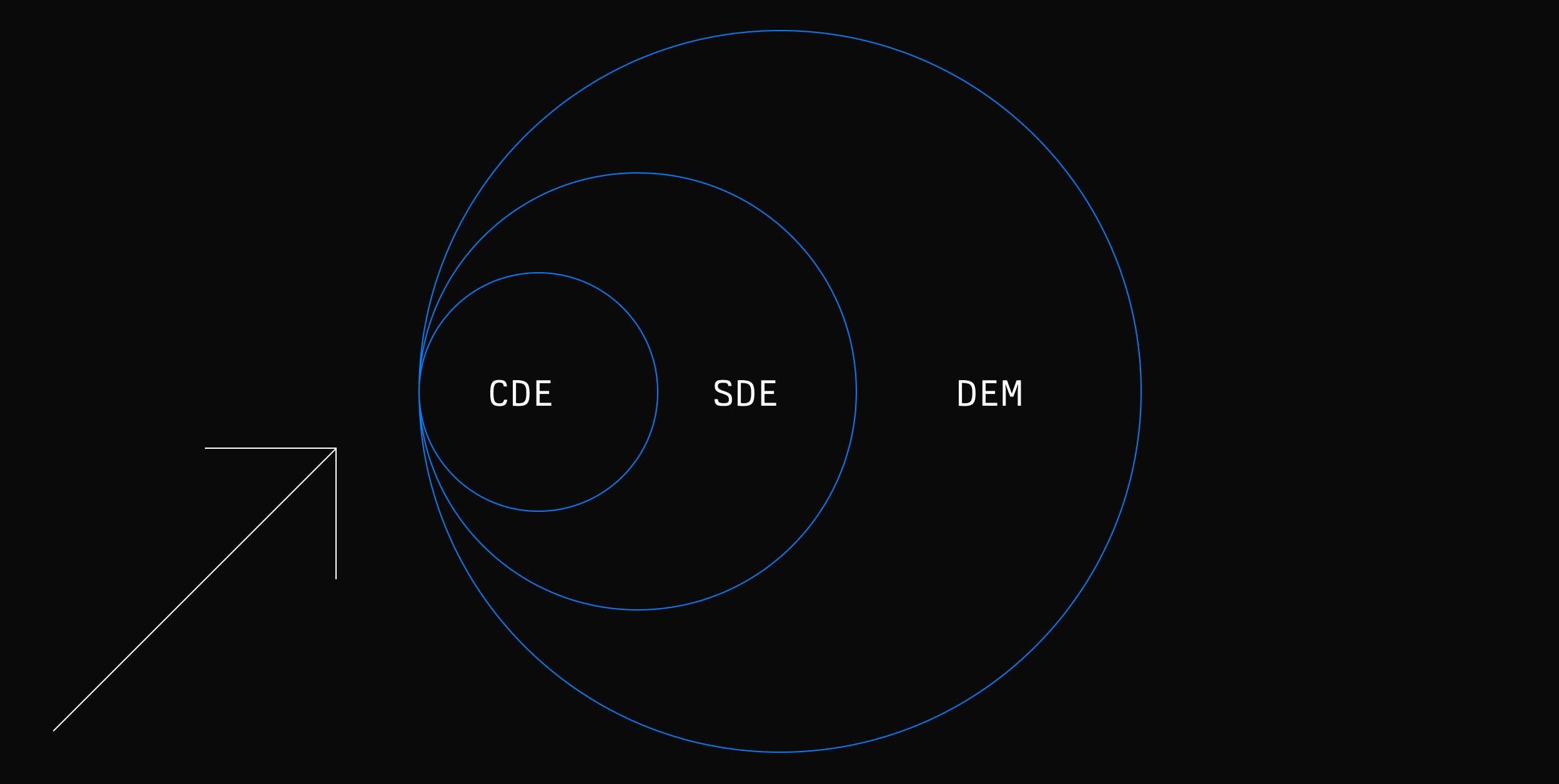The cloud development industry has existed for a decade and a half, and during that time, companies have offered a vast array of products and services – you’ll find anything from what I call Interface products to more complex dev tools. It could be something as simple syntax highlighting tools such as Collabedit, all the way to deep infrastructure tool that orchestrates and manages development environments like Daytona.
The Emergence and Limitations of the "CDE"
In recent industry discussions, including insights from Gartner and other leading analysts, the term "CDE" (Cloud Development Environments) has gained traction. However, this terminology bothers me, and here's why.
First and foremost, implying that development environments will eventually be 100% cloud-based seems shortsighted. Even as companies such as Uber, LinkedIn, and Airbnb have reported substantial returns on their investment in internal cloud development environments, and we see a clear trend of more companies adopting cloud development workflows - nothing in this world exists in absolute terms.
For example, a developer may work on a small front-end app without needing a larger compute and specific security requirements. In this case, it still would be easier for that developer to use a local development environment.
Another prime example is the impact of Apple's M CPUs on the everyday lives of developers. As technology continues to evolve, we can be certain that both local and cloud-based development environments will constantly improve and adapt to meet the evolving needs of developers.
In short, no matter where you stand on the cloud vs. local debate. Or if debate exists at all. It is clear that we are already in a world of Hybrid Development Environments. Although I believe that the percentage of which type will be used more in the future will change, it is clear that there will be space for both.
Examining Other Market Definitions of Development Environments
Upon reflecting on this dual reality, we realized that the term "CDE" falls short of capturing the essence of the product we deliver. Our ethos is anchored in hybrid development – a blend of local and cloud-based systems. Hence, "CDE" doesn’t fully encapsulate our vision.
Our inclination is towards the term "Standardized Development Environment" or "SDE" for short, which feels more accurate. In a Hybrid world, the ideal scenario is one in which a single system can start a development environment in the cloud and then spin it up locally using the same standard. You can delve deeper into our thesis on SDE here. However, I'll continue using "CDE" for ease of understanding in this article.
Notably, when market arbiters like Gartner or Forrester classify a market sector using terms such as "CDE", it creates a common misconception. The product offer isn't a CDE; it merely facilitates one.
To draw an analogy, the construction industry isn't merely termed "building"; it’s the "construction industry" as it encompasses a variety of entities like architects, engineers, contractors, and suppliers. Although a building is a tangible outcome, the industry itself is a broader spectrum.
In a similar vein, entities like Daytona or GitHub with Codespaces offer a CDE service but aren’t CDEs in themselves.
As we started researching for apt terminology, our first encounter was with "Development Environment as a Service". Though it seemed to fit at first glance, the term, wittingly or unwittingly, hints at a Software as a Service-like offering, which could mislead in the context of Daytona—a self-hosted solution. Hence, the "as a Service" descriptor falls short.
Venturing further into the wider developer market landscape, we revisited other market definitions and stumbled upon SCM (Source Code Management). The likes of GitHub, GitLab, and Bitbucket have carved a niche not merely as "source code repositories," but by extending source code management services.
Considering "Development Environment Management"
Utilizing the SCM analysis as a guide, we considered another perspective: what about the title "Development Environment Management" or DEM for short? We searched online had anyone ever used it and stumbled upon a single definition. It resonated well, but I felt it could be sharpened a bit.
Let's sharpen this definition:
Development Environment Management (DEM) encapsulates the process of creating and managing the development environment, either within an enterprise or in the cloud, equipped with the requisite tools and setup needed by the development team. It includes provisioning and configuring development environments, integrating various tools into cohesive workflows, automating repetitive tasks, and ensuring consistency across different teams and projects. Standard practices and automation ensure that all developers have access to a consistent, secure, and standardized development environment, thereby enhancing productivity and boosting development velocity.
Doesn't this accurately capture what every competitor in the market is striving for? Perhaps it isn't perfect and is overly verbose. However, it feels much closer to the mark.

Hence, Cloud Development Environments (CDEs), as the term implies, are services offered within the broader framework of Development Environment Management (DEM).
The DEM Proposition
So, to wrap it all up. Daytona does indeed provide a Cloud Development Environment as a part of our service, but that's merely a fragment of the whole picture. What we are fundamentally about is creating standardized development environments that fluidly transition between local and cloud configurations. Daytona, at its core, embodies a Development Environment Management platform.
Therefore, I humbly propose adopting the term "Development Environment Management" to represent our industry. This title not only acknowledges the hybrid nature of our future but also is more encompassing and accurately characterizes the role of companies like Daytona in provisioning, managing, and optimizing these environments.
Thank you for delving into this intricate exploration with me. Your contribution to the discussion is invaluable as we navigate the semantics landscape of our evolving industry.



